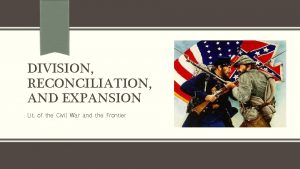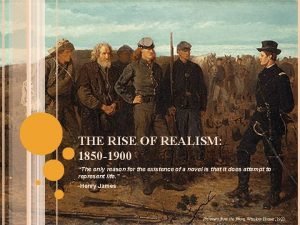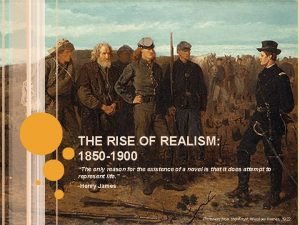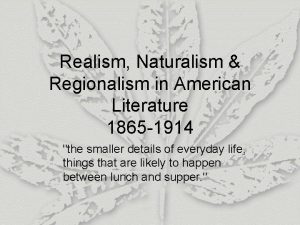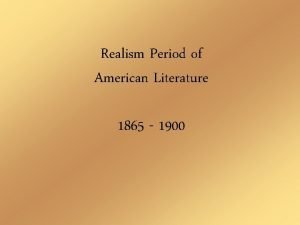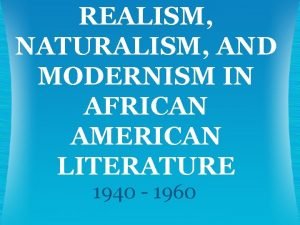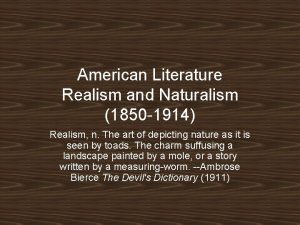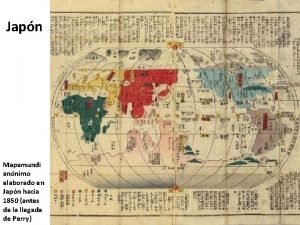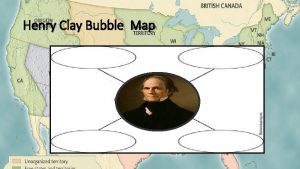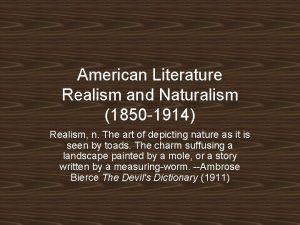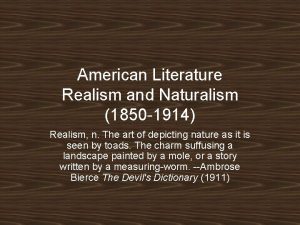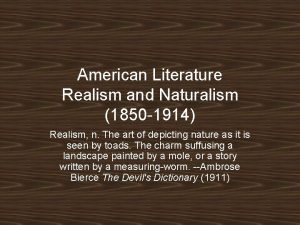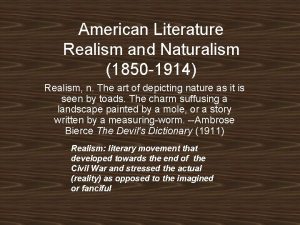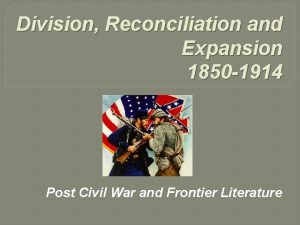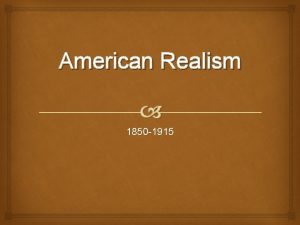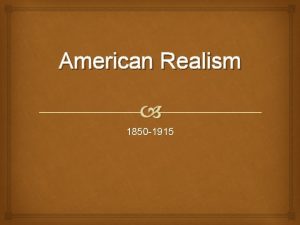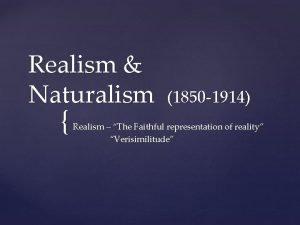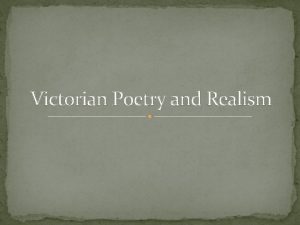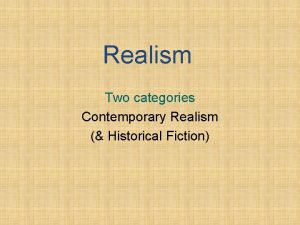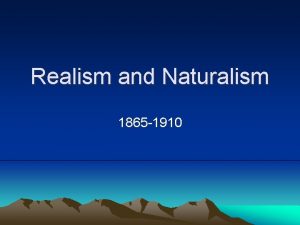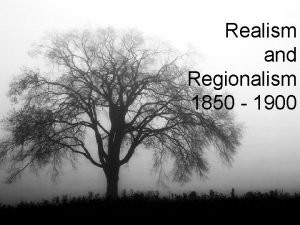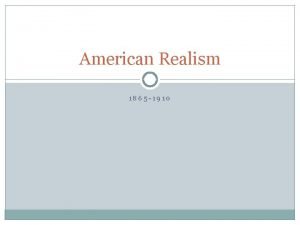American Realism 1850 1914 Division Reconciliation Expansion Navigation




























- Slides: 28

American Realism: 1850 -1914 “Division, Reconciliation, Expansion”

Navigation Literary Movements Westward Expansion Author Bios Urbanization Slavery Civil War

Literary Movements • The writing of this period steered away from the Romantic, highly imaginative fiction from the early 1800’s. • The four main movements are known as: – Realism – Naturalism – “Literature of Discontent” – Regionalism π

Realism • Most of the famous literature from after the Civil War is called Realism. • These writers turned away from Romanticism. The immense cost of life from the Civil War disillusioned Americans from their early 1800’s idealism. • Their plan was to portray life realistically (hence the name), and people as they were. Mov’t | π

Realist Writers • • Mark Twain William Dean Howells Henry James Edgar Lee Masters

Naturalism • Naturalism is NOT “hippie-fiction. ” • It is more pessimistic than Realism, primarily. • The Naturalist writers believed that larger forces were at work: Nature, Fate, and Heredity. • Their writing was inspired by hardships, whether it was war, the frontier, or urbanization. Mov’t | π

Naturalist Writers • • Stephen Crane Ambrose Bierce Jack London Edwin Arlington Robinson Katherine Anne Porter Charlotte Perkins Gilman Edith Wharton

“Literature of Discontent” • Along the lines of Naturalism, the social problems of this period were seen as a force to deal with. • Many groups, from women to freed slaves, started expressing their discontent with the way things were. • They started addressing these issues in their writing. Mov’t | π

Regionalism • Regionalism is all about “local flavor” or “local color. ” • “Local Color” means a reliance on minor details and dialects. • They usually wrote about the South or the West. • More often than not, these stories were full of humor and small-town characters. Mov’t | π

Regionalist Writers • Kate Chopin—South • Mary E. Wilkins. Freeman—New England • Mark Twain—West • Willa Cather—Midwest

Author Bios Stephen Crane Ambrose Bierce Mark Twain Jack London Kate Chopin Bret Harte π

Mark Twain • Born: Nov. 30, 1835 Died: April 21, 1910 • He was raised on the Mississippi River in Missouri and spent much of his youth either working as a printer’s apprentice or working on a steamboat. • Much of his adult life was spent travelling as a correspondent for various newspapers. • He started publishing novels in 1872 and continued to travel and lecture until his death. π

Mark Twain: Important Works • “The Celebrated Jumping Frog of Calaveras County” – 1865 • Tom Sawyer – 1876 • Huckleberry Finn – 1884 • “A Connecticut Yankee in King Arthur’s Court” – 1889 • “The Man That Corrupted Hadleyburg” 1900 Bios | π

Stephen Crane • Born: Jan. 5, 1871 Died: June 5, 1900 • He moved to New York City from his home in Newark around the early 1890’s. • This backdrop was an inspiration for his first novel, and opened his eyes to the urban experience. • He worked as a journalist for many years, covering the war in Cuba, where he almost drowned when his ship sank in 1897. • After extensive travel and reporting, he died of TB while living abroad in Germany. π

Stephen Crane: Important Works • Maggie: A Girl of the Streets – 1893 – The story of an urban girl’s descent from the slums to prostitution and her eventual death • The Red Badge of Courage – 1895 • “The Open Boat” – 1898 – This short story was inspired directly by his near-death experience in Cuba. Bios | π

Bret Harte • Born: Aug. 25, 1836 Died: May 5, 1902 • Bret Harte moved to a mining community in California at the age of 13 (1854). • He wrote about these communities for newspapers around 1857. • Harte often collaborated with Twain as an editor for the Californian newspaper around 1864. • After a brief stint of success, his career started to flounder around the mid 1870’s, until he resumed in London from 1885 until his death. π

Bret Harte: Important Works • Condensed Novels – approx. 1870 • The Luck of Roaring Camp, and Other Sketches – 1870 – This collection contains “Outcasts of Poker Flats, ” one of the selections we will be reading. • Ah Sin – 1877 – Bret Harte collaborated with Mark Twain to write this play Bios | π

Kate Chopin • Born: Feb. 8, 1851 Died: Aug. 22, 1904 • She was born in St. Louis, MO, but she moved to Louisiana after her marriage in 1870. • She wrote primarily on life in Louisiana and the people she met in the Bayou, Creole country. • Kate wrote some early, relatively unknown novels, but made a name with short stories and her seminal work, The Awakening. • After she was widely shunned for writing The Awakening, Kate Chopin retreated away from any major writing until her death in 1904. π

Kate Chopin: Important Works • At Fault – 1890 – Her first novel was met with little revelry or success. • “Desiree’s Baby” – 1897 • The Awakening - 1899 Bios | π

Ambrose Bierce • Born: June 24, 1842 Died: 1914 (UNK) • He enlisted in the army at 1861 and fought in many battles, taking serious wounds in 1864. • He, too, spent much of his professional life working for newspapers as a correspondent and witty writer. • While working on columns and magazines, he wrote some of his best and most famous short stories. • Old “Bitter Bierce” slipped off to Mexico in 1913 and likely died in the midst of Pancho Villa’s revolution in 1914, but his actual end is unknown. π

Ambrose Bierce: Important Works • “The Haunted Valley” – 1871 – His first story to be published • “An Occurrence at Owl Creek Bridge” – 1891 • The Devil’s Dictionary – 1906 – A collection of ironic and bitter definitions on common words, as well as one of Bierce’s most famous and enduring works. Bios | π

Jack London • Born: Jan 12, 1876 Died: Nov. 22, 1916 • His father, a roving astrologer, left young Jack with his mother, a spiritualist, and step-father. • His youth was spent working as a sailor and seeing much of the country as a “hobo” on a train. • In 1893, he joined a protest army of unemployed Americans, and in 1894 became a militant socialist. • He started writing of his Alaskan adventures and time in the Yukon gold rush in 1900. • He committed suicide in 1916 as an unsuccessful writer and alcoholic.

Jack London: Important Works • The Son of the Wolf – 1900 – Jacks’ first novel earned him a wide, audience. • “Call of the Wild” – 1903 • “White Fang” – 1906 • The Iron Heel – 1907 – This political future/fantasy novel anticipated the rise of fascism with frightening accuracy. • “To Build a Fire” – 1908

The Reasons for the Change

Westward Expansion • In 1862, The Homestead Act promised 160 acres to anyone willing to live on and improve land out in the Western territories, leading to a massive migration. • About 500, 000 or more farmers headed west, joined by miners, and cattle ranchers, all wanting their free land chance at wealth. • The first Transcontinental Railroad was completed in 1869, furthering the push for expansion. π

The Frontier is Now Closed • The 1890 census reported that America’s frontier no longer existed. • A steady stream of immigrants, farmers, African-Americans, just to name a few, had filled up the frontier with farms and cities. π

Urbanization • European immigrants flooded America’s cities all along the East Coast, primarily New York City. (At least 9 Million in 20 Years) • The east coast cities were heavily unprepared for that many people • This quickly lead to vast overpopulation resulting in high crime, slums, and many other related problems. π

The Great City • Skyscrapers, traffic, air and noise pollution, all became part of life in the big city. • The industrial city needed workers, but often paid them poorly. • Wages were so bad that one or two working adults could not support a family, so child labor became a common necessity. π
 Division reconciliation and expansion
Division reconciliation and expansion Realist novel
Realist novel Realism 1850 to 1900
Realism 1850 to 1900 Regionalism american literature
Regionalism american literature Realism vs anti realism
Realism vs anti realism Briefly recap
Briefly recap Realism vs anti realism
Realism vs anti realism Jimmy fallon gadsden purchase
Jimmy fallon gadsden purchase Characteristics of realism in literature
Characteristics of realism in literature Realism in american literature
Realism in american literature Naturalism in literature definition
Naturalism in literature definition Realism naturalism modernism in african american literature
Realism naturalism modernism in african american literature Development of modern american drama
Development of modern american drama American realism essay
American realism essay Realism
Realism Short division vs long division
Short division vs long division F(3)
F(3) Short division and long division
Short division and long division Synthetic division with polynomials
Synthetic division with polynomials Where was prussia in 1850
Where was prussia in 1850 Theme of the necklace
Theme of the necklace The necklace mathilde
The necklace mathilde The necklace climax
The necklace climax Charles palabino
Charles palabino N
N Neoclassical
Neoclassical Desarrollo de ejercicio
Desarrollo de ejercicio Japon mapamundi
Japon mapamundi Explain the compromise of 1850
Explain the compromise of 1850
